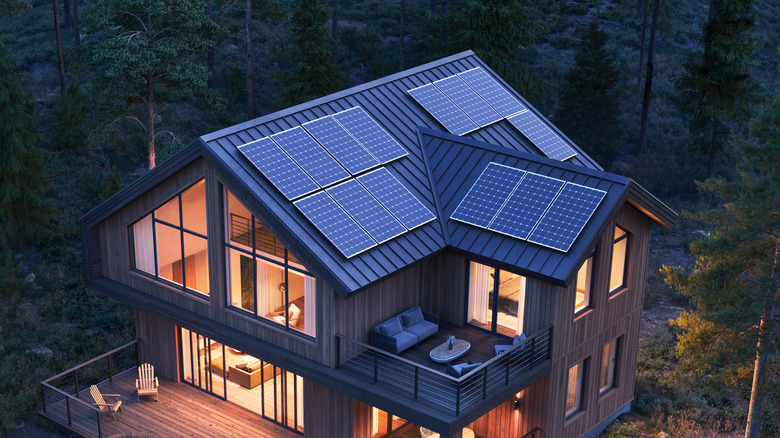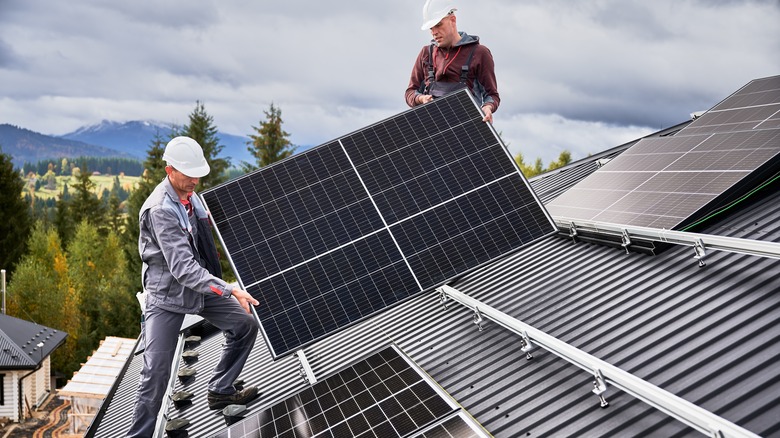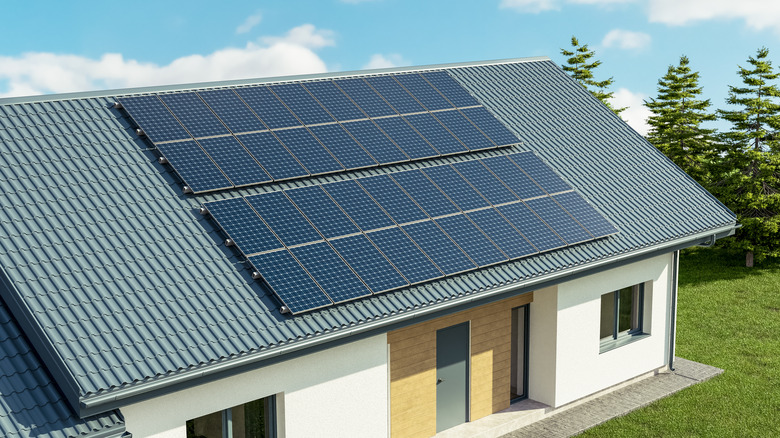What You Need To Know Before Buying A House With Solar Panels
Buying a house these days is no easy feat, with prices through the roof and the supply of suitable homes on the market dwindling. Therefore, if you are fortunate enough to secure one, you want to make sure it's in good shape, worth your money, and, if you're interested in a smart home, equipped with all the must-have devices. Additionally, you could even buy a house with solar panels, affording you an alternative and effective energy source. If you elect to do so, you should know a few key things first.
Solar panels don't last forever, and much like the roof of the home itself, it's important to know how old your panels are. It's standard for them to work effectively for about 20 to 25 years before they need to be replaced. The inverters — with types including string or micro — may also need to be replaced over time. String inverters last between 10 and 15 years, and micros last roughly as long as panels.
When the panel system is clean and working at its best, you can look forward to it collecting plenty of energy to keep the lights on. Of course, they must receive ample sunlight, and the panels must be large enough to take in enough energy. The average residential solar panel is approximately 65 by 39 inches, and can produce between 250 and 400 watts of electricity per hour. For reference, the average home requires around 29,130 watt-hours each day. Some systems even include a battery to store solar energy for emergencies.
Knowing the longevity of the solar panels and how much energy they'll generate during this time is essential. However, as often happens, the key questions will center on the money involved. For a home buyer, what savings might the energy system afford them? Or what costs might it incur?
The cost of solar panels
There's a lot to keep in mind regarding the financials of a house with solar panels. First and foremost, you want to be aware of the cost to replace them if needed. Installing a brand new 6-kilowatt system can come close to $13,000 on average. It's also a few thousand dollars to remove an old system, so if you're looking to remove and replace it, expect a large bill. These financial figures depend on your location, the number of panels, and other individualized factors. Additionally, contacting trained professionals to handle such work is vital to avoid pricey errors.
Solar panels also bring the potential for hidden costs that could blindside someone purchasing a property that includes them. Alongside typical labor and installation expenses, the bills could roll in for permits and paperwork, supply chain emergencies, or a hefty excess for those paying for the installation via finance rather than cash. Speaking to CNET, Garrett Mendelsohn, CEO of Solar Bootcamp, said, "If the cash price is $100,000, the financed price is $140,000."
The energy efficiency and savings of solar panels
It's clear that solar panels are big-budget investments, but that's not to say that they don't come with benefits. For instance, it has been shown that homes with solar panels generally sell for more than those without. A study conducted at the Lawrence Berkeley National Laboratory found that many buyers see them as an upgrade to a home and have willingly paid a premium of $15,000 on average for a standard-sized system. If you're not looking to sell, you can reap some tax incentives. The Database of State Incentives for Renewables & Efficiency is a great resource for finding discounts state-by-state.
Savings in the utility department can also be expected while owning such a house. Should your residence have suitably sized solar panels, you can anticipate saving over a thousand dollars per year throughout the lifespan of your panels, thus offsetting the cost of installation or replacement in the long run. Plus solar panels don't release greenhouse gases or any other kind of air pollution into the atmosphere, making them a clean alternative to more conventional energy sources like electricity and natural gas.


